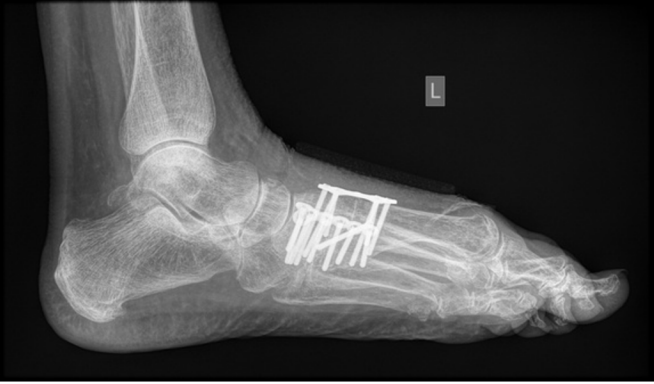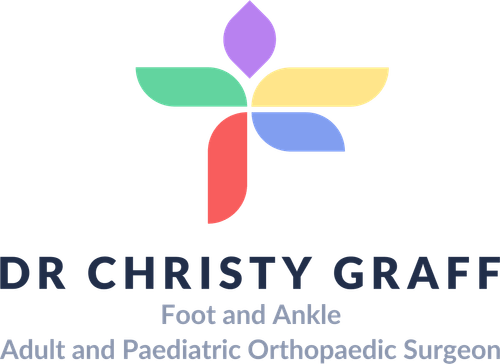Fusion (Arthrodesis) of the Midfoot
Fusion (Arthrodesis) of the Midfoot Information Sheet
Fusion (Arthrodesis) of the Midfoot Surgery
- The surgery involves making the affected joints into one bone.
- The bones need to be held in this position with fixation, which can be plates, screws, bolts or an external device (circular frame).
- Sometimes bone graft from another part of the body (often the pelvic bone near the hip) is used as bone graft to help the bones fuse; artificial bone graft is also used.
- X-rays are used in theatre to make sure the bones are aligned correctly, and there is a tourniquet placed around the thigh to help with bleeding.
The surgery can take 90 to 180 minutes.

The Hospital Stay
- Unless you have a circular frame, you wake up with a half plaster (backstab) or a boot
- Your foot will be elevated overnight, and you have antibiotics through a drip
- You will need blood thinners to prevent DVT You will vitamin C to help with pain management and wound healing
- You will stay in hospital for 2-5 days with antibiotics, blood thinners, regular paracetamol, regular laxatives, regular vitamin C and stronger pain killers to take if and when required
- You will be only allowed to touch your foot to the ground for 6 weeks
- Depending on your balance and strength, you may need rehabilitation post operatively
- Buying a second hand knee scooter pre operatively (can search online) and practicing at home before the surgery, can be helpful; please bring it into the hospital with you. It is easier to use a knee scooter than crutches
When You Go Home
- You will need medications for pain relief; regular paracetamol (2 tablets four times a day) is recommended, as well as strong pain killers, especially at night before bed. These can have side effects of drowsiness, nausea and constipation, and other tablets to help with these side effects may be required.
- You will need blood thinners and vitamin C as prescribed
- You will need a shower chair and bags to keep the plaster / boot dry
- You will need to attend your post op appointment in 2-3 weeks where the wounds will be checked and your plaster changed to a waterproof cast if your wounds are healed
- After this you will be able to shower with a shower chair and get the plaster wet
Rehabilitation
ALL patients are different. These timelines are only a guide, and some patients may progress faster or slower than others.
0-2 weeks
- Backstab or boot full time for 2-3 weeks
- Touch weight bearing only Strict elevation on 3 pillows and only mobilise or essential things like toileting
- Bag the leg for showers
- Pain relief: Please take regular paracetamol with meals; stronger pain killers are often needed
- Please take blood thinners as prescribed to prevent blood clots and vitamin C 500mg twice a day
2-3 weeks
- Post op appointment for a wound review and x-ray
- Full cast (often waterproof if the wounds are ok) or continue with the boot for another 3-4 weeks
- Continue elevation on 3 pillows
- Commence core and static strengthening and balance exercises with physio
6 weeks
- Commence weight-bearing in a boot
- Continue strengthening exercises with physio
12 weeks
- Commence weight bearing in supportive shoes/boot with a rocker bottom if swelling allows
- Swelling management with elevation, compression and ice
- You can start swimming and cycling
6-12 months
- If xrays show satisfactory fusion of the bones, increase physiotherapy such as jogging and sports specific training
- You may need your metalwork removed if it bothers you
When Can I Drive?
- Left foot 4-6 weeks Right foot 12 weeks
When Can I Return To Work?
- Seated work at 2-3 months
- Prolonged standing 8-12 months
- Heavy labour work 12-18 months
Fusion (Arthrodesis) of the Midfoot Surgery Risks
- Anaesthetic problems
- Nerve/vessel/tendon injury
- Blood clots
- Infection
- Stiffness
- Tendon irritation
- The fusion does not heal (non union)
- The fusion heals in the wrong position (malunion)
- Ongoing pain/ swelling
- Chronic Regional Pain Syndrome
- Arthritis in neighbouring joints
- The need for further surgery
Contact Us
If you want more information or have any questions or problems, please contact Dr Graff at
admin@christygraff.com or call the rooms at
0493 461 133.

